
October 26, 2010 — Board president and former executive director of MoveOn.org, Eli Pariser presented his research on “Algorithms, the News and Democracy” at a Shorenstein Center event. Introducing Pariser, Clay Shirky, Visiting Murrow Lecturer, explained that while there are “a lot of people who understand the technology really well but don’t understand the society very well,” Pariser “has always had a set of normative and humanistic attitudes toward our use of the tools which makes him an invaluable voice.”
Relevance has reached a powerful and desirable place among websites today for many reasons, Pariser said. First, relevance is “at the core of monetizing content” and thus of generating revenue. “Relevance feels good,” Pariser said, and quoted leaders in the social media and online technology field who agree that personalized content is a good thing. But Pariser sees problems at a societal and individual level.
Instead of a “shared context” that comes when people read the same articles, the algorithmic news filter sends a different set of news stories to each person. “The mechanism is invisible,” Pariser added, “so you can’t see on what basis information is being ruled in or out.”
The “hype of disintermediation,” Pariser explained, is the idea that “we’re no longer relying on gatekeepers, or the elite editorial bureau to decide what we hear.” In reality, he said, “we’re moving from one kind of middle layer to another: human to algorithmic.”
Personalized content is everywhere, Pariser said. Google Search and News, Netflix, Amazon, iTunes, even The New York Times and Washington Post are “moving in a more personalized direction.” When the “most revered journalistic institutions in our country have given a chunk of valued real estate to this kind of algorithmic process … we need to pay close attention to the system of ethics that informs that part of the front page,” Pariser said.
But “relevance isn’t the only thing that matters,” Pariser concluded. “Seeing the whole picture, being exposed to new things, social importance” are critical to a democratic society. He hopes to “build curation systems that call out the citizen in people, rather than just appealing to them as consumers of commodified information.”
This article was written by Janell Sims and the photos taken by Leighton Walter Kille, both of the Shorenstein Center.

